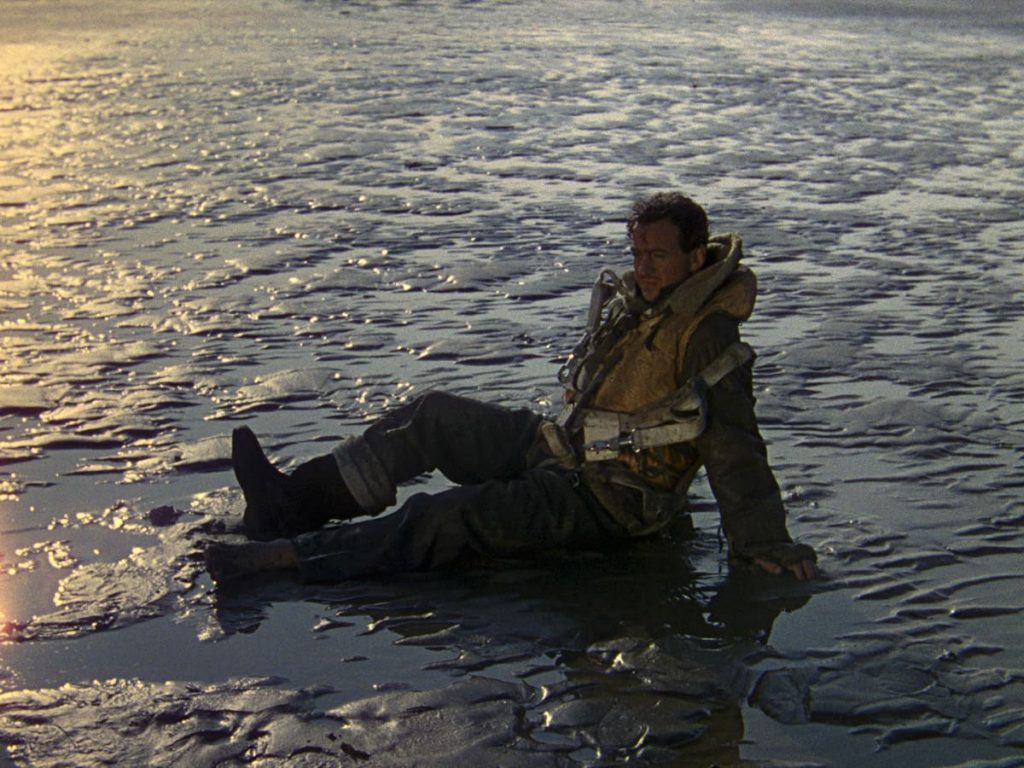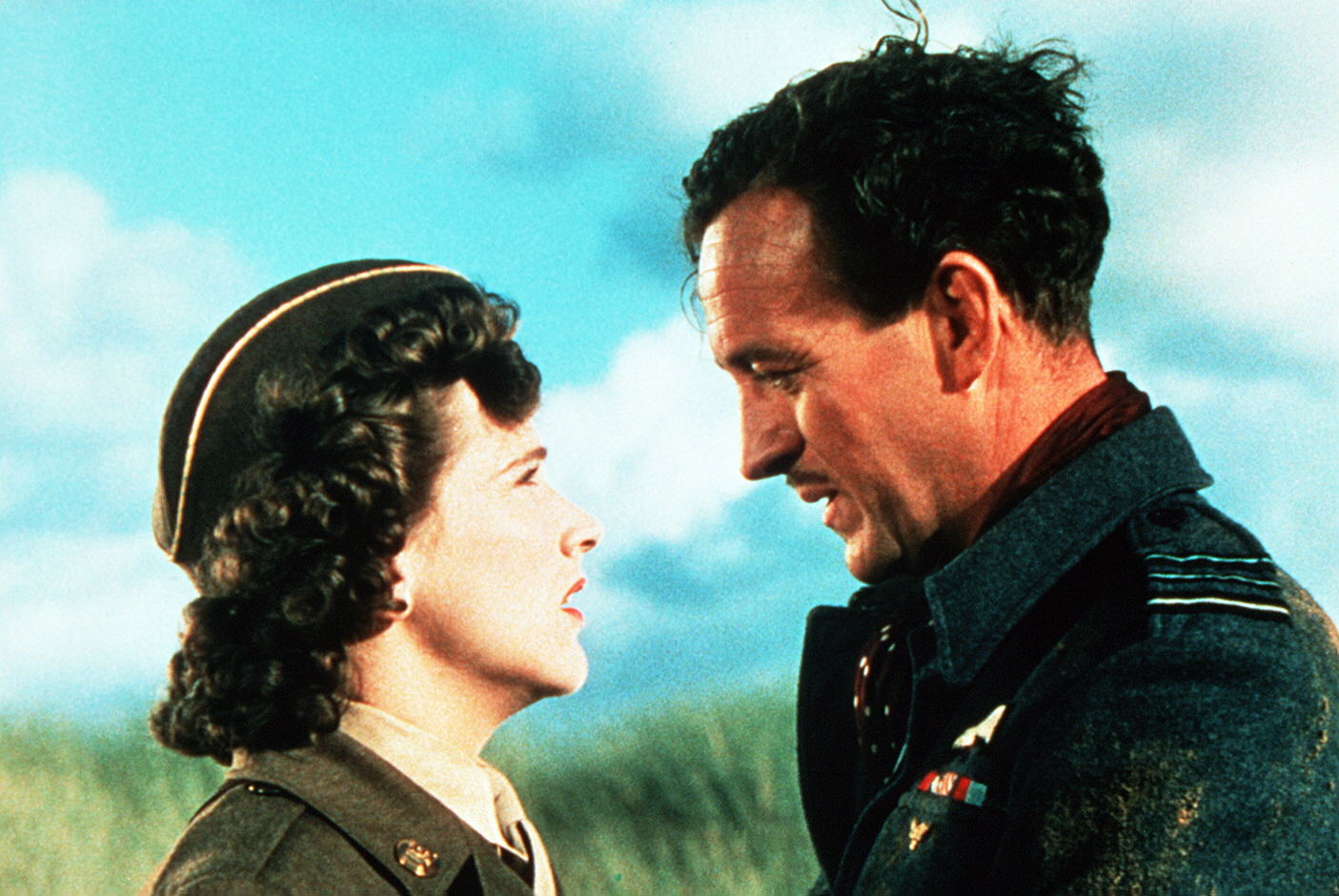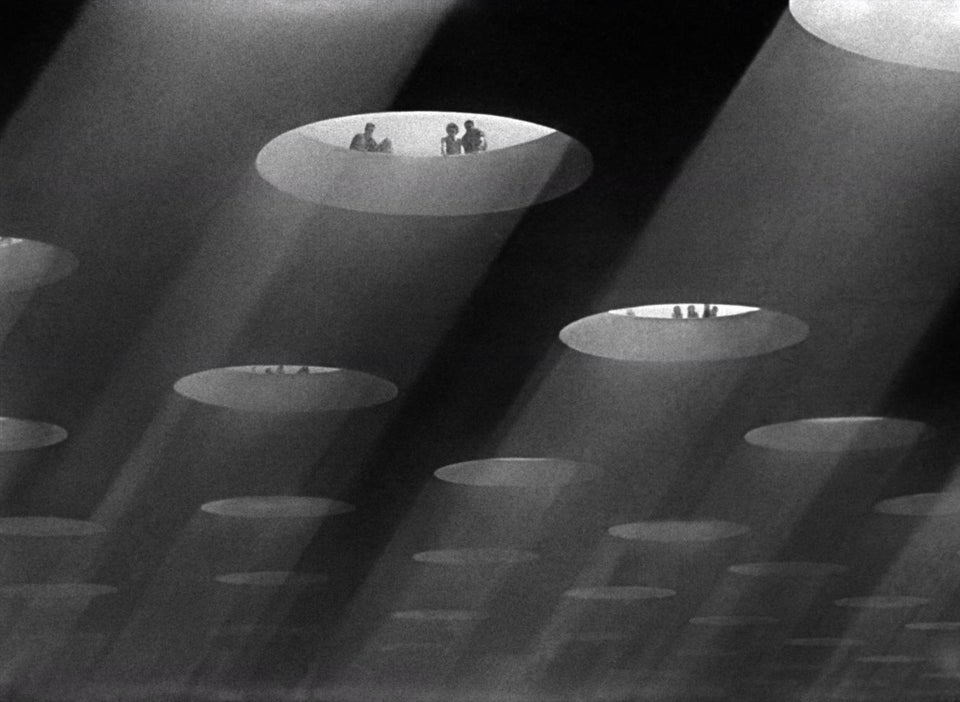Summary:
After a British pilot miraculously survives jumping from his plane without a parachute, all the powers of heaven convene for a court case to see if he should be allowed to live.
My Thoughts:
I love classic films from the 1930s and 40s. So many of those films have an overwhelmingly charming outlook on life, but for cinephiles like myself, they also provide a glimpse back in time at the early days of one of our most favorite art forms, when those that were making films were still laying the foundations of filmmaking, and it’s in these films that we get glimpses of techniques perfected in later years.
While it was the directing pair Michael Powell (“Peeping Tom”) and Emeric Pressburger (“The Red Shoes”) and their highly original concept that brought me to the film, it will be the production design and special effects that stick with me the longest. I will admit that the middle portion of the film is a bit slow, and the climax of the film doesn’t quite pack the punch I wanted it to, but the overall experience of watching “A Matter of Life and Death” is one that I’d recommend to most of my fellow cinephiles, but for your average moviegoer that lines up only to check out the latest Marvel or DC movie, I think this might be a bit too slow for their tastes. This is no “Black Narcissus” (also from Powell and Pressburger), but it’s pretty darn entertaining.
“This is a court of justice, not law.”
(Some Spoilers About the First Thirty Minutes in the Following Paragraph)
As Peter Carter (David Niven, “Around the World in 80 Days (1957)”) flies high above Britain, his plane is shot and he realizes that he doesn’t have a parachute. In desperation, he radios to whomever is listening, only to come in contact with an American woman named June (Kim Hunter, “Two Evil Eyes”) whom just so happens to be stationed in Britain. Peter tells June he won’t make it, and then jumps from his plane only to somehow miraculously survive. After wandering round the place where he fell, Peter runs into June and the two quickly fall in love. Meanwhile, at the gates of heaven Peter’s friend Bob (Robert Coote, “The Ghost and Mrs. Muir”) waits for him to arrive, and when he doesn’t, he confronts the Angel at the gates (Kathleen Byron, “Black Narcissus”) whom quickly informs the powers of Heaven that one of those that died in the battle has been lost in Britain’s inclement weather. Heaven sends Conductor 71 (Marius Goring, “The Barefoot Contessa”) to find Peter and bring him up to heaven, but when the conductor finds him and tells Peter it is time to die and go to heaven, Peter resists, saying he is in love with June and must stay to see that love grow. Heaven grants him an appeal, and the universe itself gathers to watch the case unravel.
So, I think this concept is really cool, and I honestly think the way that the film approached some of the ideas was really great as well. The idea of a man dying but not being taken to heaven due to a clerical error is somewhat humorous, but the way that Powell and Pressburger flush out their world gives it a lot more depth and meaning; it allows them to touch on bigger themes as a whole, make us take a step back and look at what really matters in the scope of the universe. The way this film starts reminded me, in a way, of “It’s a Wonderful Life” (also released in 1946); we begin by falling through the stars, though instead of listening to God talk to the Angel Clarence through pulsing lights, we hear a narrator casually listing off facts about the universe. As we make our way past lightyears worth of stars and galaxies, he talks about the vastness of the universe, about how some solar systems have exploded (he also makes a comment about how that particular Solar System must’ve meddled with the uranium atom- remember this was right after WW2- there were plenty of Atomic Scare elements to all sorts of movies back then), but then eventually we come to Earth, and slowly, the camera starts to push in even further until finally we join our protagonist in the midst of a battle.
By starting far away from Earth, and slowly pushing in until we see the battle, we get a sense of how small and insignificant, even pointless, any battles are. Why are we fighting on earth when, compared the scope of the universe, none of our tiny squabbles matter? At the same time, while this film wants us to put into perspective our own problems, it also wants to push us to focus on the more important things in life: love. While I will be the first to admit that, when in the wrong hands that theme of “love conquers all” can be cheesier than Kraft macaroni, in this film, the way that topic was approached made it feel special. Why? I’m not even sure if I can tell you why the themes worked so well for me, but I think it’s because of the fact that the stakes were so small, but the scope was so epic: the entirety of the universe convenes to see if this couple should be allowed to stay together. It’s as if to say, even though none of our problems really matter when compared to the size of the universe, love still does matter. Tenderness between people can change the world, neigh, the universe, if it’s given a chance to blossom.
The production design is absolutely breathtaking, and the way that it is shot is creative and at times feels quite ethereal. All of the shots on Earth are shot in a super-saturated technicolor, and all of the scenes that take place in heaven are in brilliant black and white. While we only get brief glimpses beyond the pearly gates (or rather, beyond the escalator to heaven- another really cool set that gets a lot of use), but what we do see looks to be Babylonian in size and design. Most of our heavenly views are from the perspective of Peter’s friend Bob; as he looks through the holes in heaven’s floors he can see what looks to be whole cities below. But the best designed part, in my opinion, was the colossal stadium that is used as a courtroom for the final hearing; the way that Pressburger and Powell shoot the stadium makes it look as if the whole population of the universe could fit inside to watch the case progress. Saying this film is beautiful to look at is an absolute understatement (as it would be with any Powell and Pressburger film).
Verdict:
While I will admit that the middle portion of this film tends to drag a bit, the overall experience of “A Matter of Life and Death” is one that I won’t forget anytime soon. This film just simply exudes classic cinema charm, and it does it in a way that pushes themes of acceptance and love; it’s simply a delight.
Review Written By:






